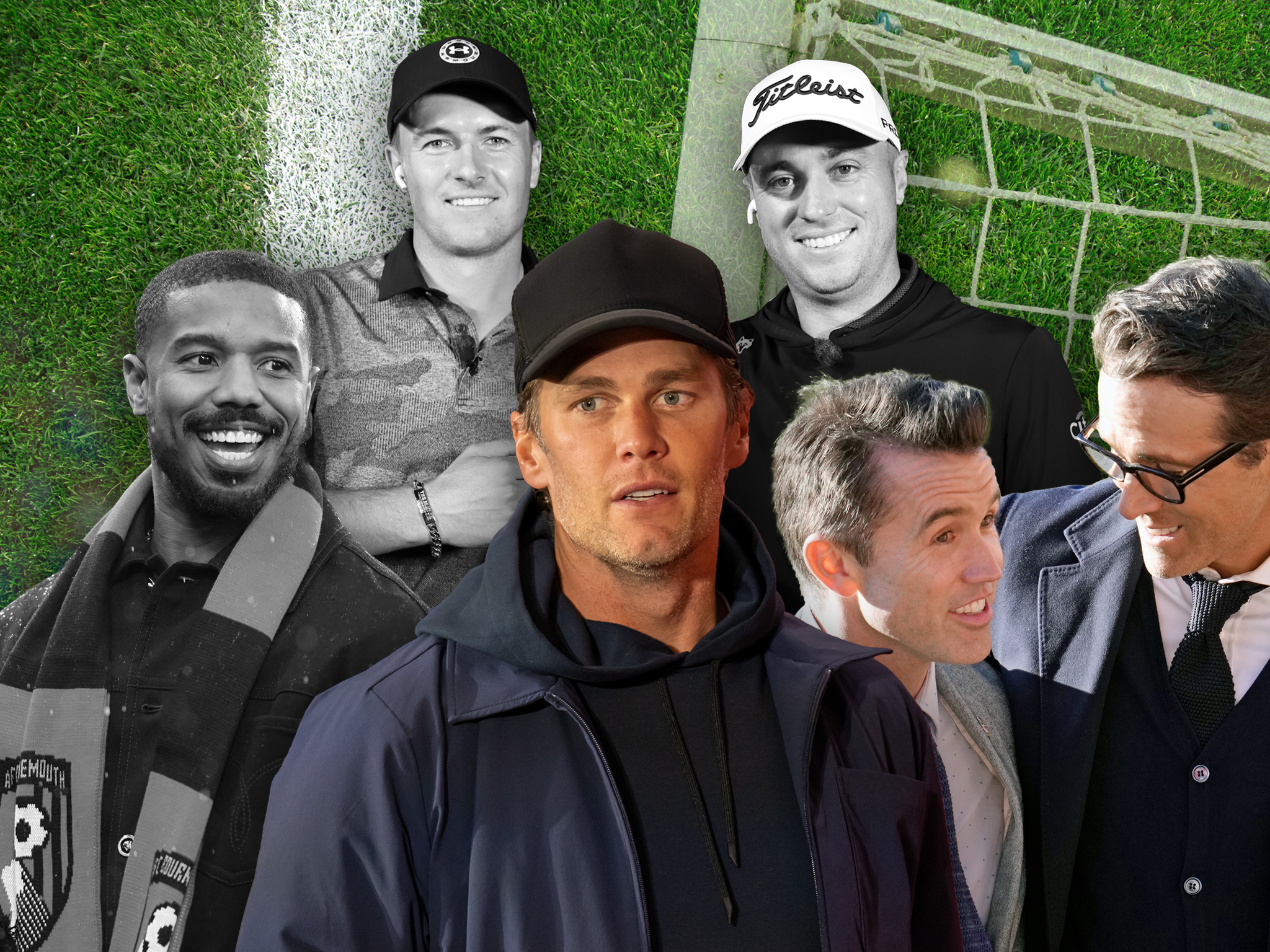Soccer for sale: What are American sport stars buying British football playing at?
From golfers Justin Thomas and Jordan Speith to the American footaball legend Tom Brady, a slew of wealthy US sportsmen with no track record in football are buying into the beautiful game, writes Jim White. If they’re looking for a Welcome To Wrexham-inspired Hollywood fairytale, they may be in for a shock


When it was announced that Tom Brady was part of the consortium of new owners at Birmingham City, a joke quickly circulated on social media.
Clearly, the greatest American footballer of all time, the man who holds the record of seven Superbowl wins, had made a geographical mistake. He must have thought the club was based in Birmingham, Alabama. Because the dominant personality in American football has never previously been known as Brady the Bluenose.
Indeed, his interest in what he would call soccer – particularly that played in England’s second city – has been entirely hidden throughout his quarter-century hurling a ball around. Yet here he is suddenly revealing a connection with a struggling championship club. But according to a new promotional video, he is on his way to the west Midlands. “See you at St Andrews,” he enthused at the end of a short clip in which he admitted that his knowledge of the game was more than limited.
And here’s the thing: Brady is by no means alone. “Hope to see you in the PL real soon,” tweeted JJ Watt, the former Houston Texans defensive end, at Brady’s announcement. Watt is part of the new ownership group at Burnley, freshly promoted to the Premier League.
Over the summer, golfers Justin Thomas and Jordan Spieth too revealed they had become investors in Leeds United. Michael B Jordan, meanwhile, is one of the new backers at AFC Bournemouth. And while he may not actually be a sportsman, Jordan made his name playing the part of the eponymous heavyweight boxer in the Creed movie franchise.
British football clubs seem to have become a must-have addition to the investment portfolio of well-remunerated American sportsmen – or those who play them in films – even if none of them have the first clue about the offside rule. “One thing,” said Thomas when he was asked about his Leeds investment during the Open at Hoylake last month, “I’m not going to be that guy who acts like he knows a lot, because I don’t. I have one hell of a lot to learn about the game.”
If it is not to fulfil a lifelong ambition, then the most obvious explanation for this sudden enthusiasm for English football among America’s sporting elite could be seen in the Snapdragon Stadium, San Diego in July. Manchester United’s U21 side were playing Wrexham in a pre-season friendly... and over 35,000 turned up to watch.
Here’s the extraordinary thing: they were not there to appreciate the youth wing of the most storied football club in England. The majority were Californians, attending the first football game of their lives. And they had been lured there by television.
They had turned out in their hordes to see Wrexham, the club put on the international map by the Hollywood pair Rob McElhenney and Ryan Reynolds. Bought to provide content for a fish-out-of-water documentary about two American soccer ingenues (well, one is Canadian) reviving a backwater, the purchase of Wrexham has been a huge television streaming success, projecting not just the football club to a worldwide audience, but its owners too.
Welcome to Wrexham has given a fresh impetus to American involvement in our game. Indeed, while more than half the clubs in the Premier League have US backers, 13 more in the Football League are now under American ownership. Though, in the majority of cases, British clubs have not been purchased to make television documentaries, but for financial potential. It is not easy to buy into American sports franchises.
The big operations in the NFL and NBA have long been the domain of the super-wealthy. They don’t come up for sale often. In England, however, light touch regulation makes it relatively easy to invest. And while, as Todd Boehly and his group that bought Chelsea last year discovered, the Premier League comes at a cost, sizeable clubs down on their luck in the championship are available at knockdown prices.
After a bit of initial investment, the huge earning opportunity is obtainable in the Premier League; it’s a return that many observers reckon will only increase as television rights become ever more valuable. The fact is, these guys are in it for the money.
For US sporting speculators moving in on underpriced assets, however, naked opportunism is not the most inviting of sells. As the growing distaste for water company owners has demonstrated, rapacious venture capitalists have never been less popular in this country. So the simplest way to disguise naked intent is to borrow celebrity endorsement. Get a well-known sportsman involved and the hope is no one will notice the moneymen in the background.
Naturally, that is not the advertised purpose. According to Tom Wagner, who purchased a 45 per cent stake in Birmingham City in July, Brady has not been invited on board to lend his renown to the organisation. “He is not here for promotional purposes,” Wagner said in an interview on Bloomberg TV. “He is here to work on partnership opportunities, as well as health, wellness and recovery programmes”. Sure.
The problem that Brady, Watt, Spieth, Thomas and the rest face is this: it is not just the rules on the field of play they may not fully appreciate about the British game. It is the reputational damage that could well lie further ahead in their involvement. Because the romantic notion delivered by McElhenney and Reynolds in their television series does not remotely represent the complete picture of football club ownership.
Despite what is going on at Wrexham, it is rarely a love-in. In the partisan world of British football, the relationship with a club owner is straightforward. If success ensues under their stewardship, as Roman Abramovich demonstrated at Chelsea, the affection is wholehearted. Anything less is invariably a problem. Owners are the first to be blamed for thwarted ambition. And owners who appear to be interested solely in financial returns – as these new US investors appear to be – are vilified. Brady need only ask his previous employers at the Tampa Bay Buccaneers how well they have fared reputationally in their English football acquisition. After all, the fan response to the Glazer ownership at Manchester United has redefined the term loathed.
For sure, at the moment, all is rosy for the newcomers and their sporting frontmen. Optimism is the football fans’ favoured mode. And, in the case of the Americans at Birmingham and Leeds, since they have taken over from hugely unpopular owners, enthusiasm is high.
“It’s definitely the most cheers I’ve got here,” Thomas said of the reception from Leeds fans around the course after he had failed to make the cut at the Open. “I need to learn some chants. I heard quite few these last five days.” Though clearly not the ones directed at his friend Ricky Fowler.
After being invited to join Spieth and Thomas in the 49ers group buying into the Elland Road club, Fowler decided against it. And as he was walking down the fairway at the Royal Liverpool Club a fortnight ago, he was spotted by a Leeds fan who had clearly enjoyed the available hospitality. “What happened to your 49ers investment?” he yelled in Fowler’s direction. “Coward. You’re a f*****g coward. F*** off.”
The truth is, for those celebrity sportsmen who think it is going to be fun involved in English football, there could well be trouble ahead.






Join our commenting forum
Join thought-provoking conversations, follow other Independent readers and see their replies
6Comments